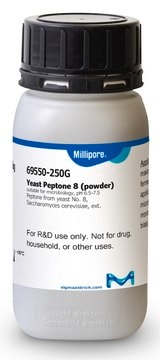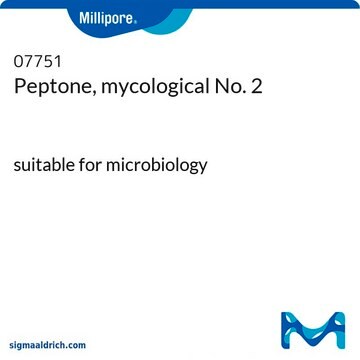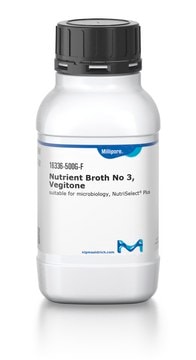49869
Vegetable Extract No. 2
suitable for microbiology
Synonym(s):
Liver Extract Replacement
About This Item
Recommended Products
biological source
plant
Quality Level
form
powder
shelf life
limited shelf life, expiry date on the label
composition
amino-nitrogen, ≥3%
total nitrogen (N), ≥9.5%
impurities
≤15.0% ash
loss
≤5% loss on drying
pH
5.5-7.5 (25 °C, 2% in H2O)
solubility
H2O: 2%, clear, yellow
application(s)
food and beverages
vitamins, nutraceuticals, and natural products
microbiology
suitability
Brucella spp.
Clostridium spp.
Related Categories
General description
Storage Class Code
11 - Combustible Solids
WGK
WGK 3
Flash Point(F)
Not applicable
Flash Point(C)
Not applicable
Personal Protective Equipment
Regulatory Listings
Regulatory Listings are mainly provided for chemical products. Only limited information can be provided here for non-chemical products. No entry means none of the components are listed. It is the user’s obligation to ensure the safe and legal use of the product.
JAN Code
49869-VAR-F:
49869-10G-KC-F:
49869-BULK-F:
49869-500G-F:
Choose from one of the most recent versions:
Already Own This Product?
Find documentation for the products that you have recently purchased in the Document Library.
Articles
Culture media provides a habitat with suitable nutrients, energy sources, and certain environmental conditions for the growth of microorganisms. The components of the culture media range from simple sugars to peptones, salts, antibiotics, and complex indicators.
Our team of scientists has experience in all areas of research including Life Science, Material Science, Chemical Synthesis, Chromatography, Analytical and many others.
Contact Technical Service








